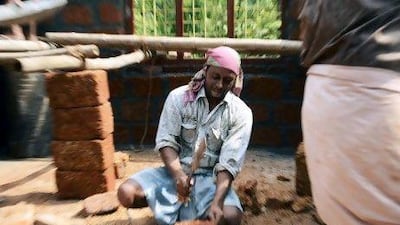PERUMBAVOOR, KERALA // As dawn breaks over the town's square, hundreds of men mill about, looking for work at the plywood factories. This is a familiar scene in cities across India. But in Kerala an increasing number of these men come from northern India.
Several decades of migration by unskilled and semi-skilled labour to the Gulf have created a shortage of these workers in Kerala. The gaps are being filled by people from West Bengal, Orissa, and Bihar. They come to the South, lured by the promise of higher wages than they can earn at home.
Irudaya Rajan, a professor of international migration at the Centre for Development Studies in Trivandrum, in Kerala, said no official data was available for what is known as "replacement migration".
But he said there are at least 1 million replacement workers in Kerala and 2.2 million Keralites living outside the country.
"There are links between Keralites leaving for the Gulf and migrants coming here looking for work," Mr Rajan said.
Certain industries such as plywood manufacturing in the town of Perumbavoor, where there are 30 factories, "are completely surrounded by migrants", he said.
Shafigul Moolah, 20, arrived here 12 years ago from West Bengal, with his then 18-year-old brother, who came looking for work. Their parents stayed in West Bengal.
Today, Mr Moolah works as a carpenter, earning 500 rupees (Dh34.5) a day.
In West Bengal Mr Moolah said he would have earned 100 rupees a day. He rents a room with three other men, and pays 300 rupees a month for rent. He sends home at least 6,000 rupees a month to his parents and his brother, who returned home.
"What I earn daily here can feed an entire family at home for a month," said Mr Moolah.
His favourite part of the day is the early morning talking with friends, while waiting for work.
"It is like listening to the news from back home," said Mr Moolah. "We make sure everyone is OK here and back home. Then we can begin work with some peace of mind."
Many of these migrants may as well be living in a foreign country. While most North Indians speak or at least understand Hindi, that is not the case in the south. Malayalam and English are the most spoken languages in Kerala.
The migrant workers speak of feeling alienated by language, culture and food. The spice bases of food are vastly different in the south. Coconuts grow in abundance in Kerala and the south but not in North India.
Mr Moolah and other migrant workers also believe they are often harassed by police.
"The police will ask for ID, then they will pretend to not believe us, no matter what we show," said Mr Moolah. "This is still our country and we are its citizens. We have not come to a foreign country to work."
In spite of the prejudices the migrant workers face, word of earning a decent wage travels fast.
Rahul Sheikh, 27, arrived in Kerala a year ago. He took a six-hour bus ride from his hometown of Baharampur in West Bengal to Kolkata. Then he hopped the biweekly Trivandrum Shalimar Express, a train that takes three days to reach the Thrissur station. Then Mr Sheikh made his way to the town of Perambavoor in another bus and a two-hour journey before he met old friends from his town.
"There is dignity in work," said Mr Sheikh. "I am not sitting around here doing nothing, unlike what I did at home."
"Besides, these are educated folk," he said. "why would they want to do these jobs?"
Kerala has the highest literacy rate in India, at 93.91 per cent, according to the 2011 census.
Thirty kilometres south of Perumbavoor lies the village of Meloor, with a population of 24,000. Here there is an acute shortage of skilled labour.
When Santosh M Shankaran, 30, started learning to be an electrician, there were 20 others in the village. Today he says he is a "one-man show". The other electricians now work in the Gulf.
Mr Shankaran is in such high demand that sometimes the villagers have to wait four days for him to show up to fix a light switch.
Mr Shankaran, a bachelor, earns up to 25,000 rupees a month.
"I have to take care of my elderly parents. That is my duty," he said, adding "it's time to start searching for a bride".
There is another electrician named Santosh who calls Meloor home. Villagers call the second Santosh "Gulf Santosh" to distinguish the two. Santosh M Vijayan, 38, works as an electrician in Saudi Arabia and is currently at home on holiday.
"I wanted to change my life so I left for new adventures," Mr Vijayan said.
Mr Shankaran and Mr Vijayan earn comparable salaries.
At a construction site, a house being built for an Indian family living in Dubai, Mr Shankaran is supervising the electrical work. He uses a mix of Hindi language and hand gestures to communicate with the daily-wage workers.
"This is what takes up my time," said Mr Shankaran. "Trying to communicate."
sbhattacharya@thenational.ae
Follow
The National
on
& Surya Bhattacharya on

